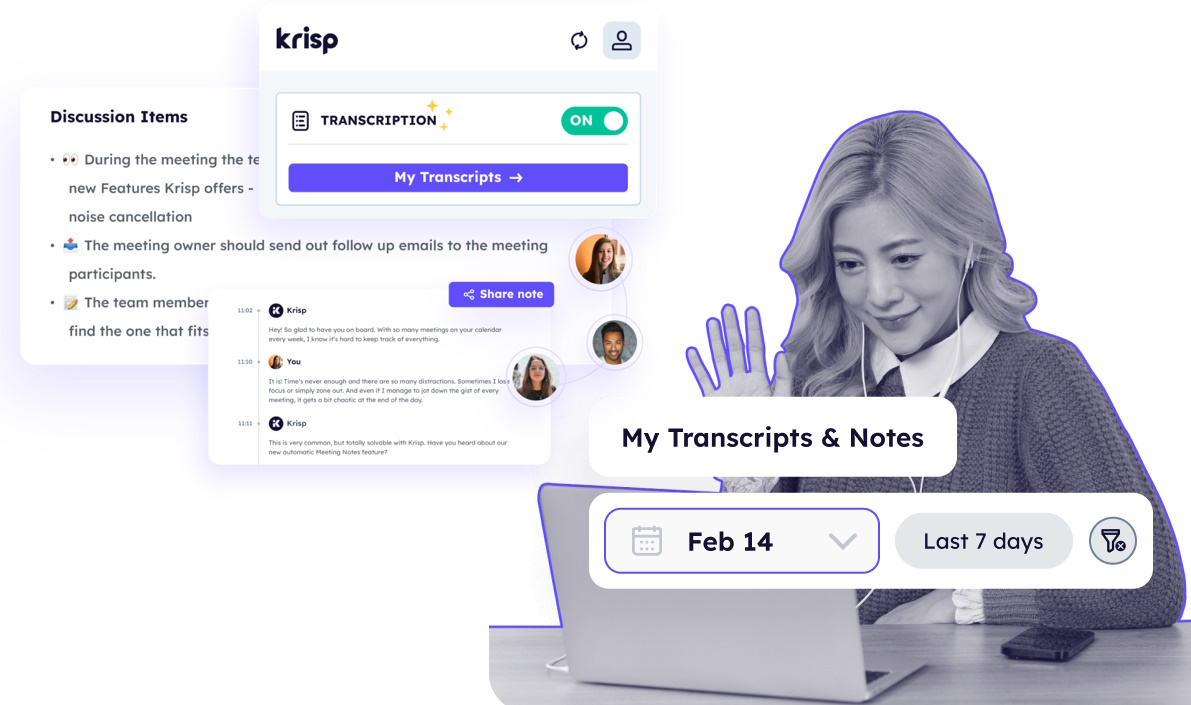
Krisp got its start as an AI-powered noise cancellation service, but now the startup is moving beyond that with instant on-device transcription of all your calls and meetings — and of course it integrates ChatGPT now for quick summaries as well. The open beta goes live today. Techcrunch reports.
My transcribing experience is usually a matter of downloading the video or audio associated with a meeting, provided someone thought to record it (and I know who that someone was), then uploading that file to a service like Otter and waiting 10-15 minutes while it processes. Compared to just a few years ago this is very convenient, of course, but the number of meetings we take online has multiplied. Wherever I can shave a few minutes or clicks off my workflow I’m usually interested.
Krisp has also shown a certain single-mindedness over the years, focusing on effective noise reduction across lots of devices and services. The advance that made it possible was basically training the system to recognize and isolate human voices, which while diverse are also distinct and very different from dogs barking, traffic noise, and so on. For me, Krisp has generally Just Worked.
So when they told me they were getting into transcription I was happy to hear it: it’s a natural extension of a voice-focused platform, and of course they know they can get a clean voice signal in.
Krisp already operates more or less behind the scenes, acting as a passthrough for audio sources. So there’s no need for the “AI Meeting Assistant”
to integrate with Google, Teams, Zoom or anything else, or be a phantom attendee — it deals strictly with your audio signal before it goes out or before theirs hits your ears. The transcription agent doesn’t need to talk to any services or APIs, it just identifies voices coming in and going out, and transcribes them, on your device.
On-device transcription is a key differentiator, for one thing because it’s simpler than dealing with audio files, and for another because the audio of your meeting never leaves your computer. I’m not sure what threat models that’s important to, but I suspect they exist and will only get more prominent in the coming years.
The transcript itself is sent directly to Krisp’s cloud service, which for some kind of negates the security advantage of on-device transcription. But if you’re willing to trust another transcriber, why not this one? And anyhow, there will soon also be an option to keep your transcripts completely on device. Krisp CEO and co-founder Davit Baghdasaryan has a deep security background and said he’s looking forward to implementing this. (I suspect it’s just easier to build a web app than add major new capabilities to multiple mobile and desktop apps.)
And how are the transcripts? In my experience, about as good as other AI-powered ones, which is to say better than my notes but not quite ready to publish. Ditching the audio right away negates one useful feature offered by other transcribers, quick checking and editing: click a suspicious word and it jumps to that spot in the audio. So for now at least, in interviews where you need to quote accurately and extensively, it may not be the best choice.
But Krisp is positioning this as more of a productivity tool, building out a platform for quick extraction of key points from the innumerable meetings we sometimes find ourselves scheduling. To that end the company allows you to quickly send the transcript in for analysis by ChatGPT, which pulls out the TL;DR, assigned actions, or whatever else needs to be pulled out of the meeting.
Frankly, I’ve never liked these features and never use them, so I can’t speak to the quality here. They’re probably as good as any other service that does this, which is to say useful to the people who find such things of use. I try to forget about the contents of a meeting as quickly as possible, no doubt to the chagrin my colleagues, but in my defense, I would just remember it wrong. Organized persons who have processes for this type of work may find the Krisp style works well for them, or not.
I also am hesitant to judge a service that is essentially an API call to another service, which itself is constantly changing. As ChatGPT improves, so will the apps that rely on it — same here as in a hundred other platforms that suddenly evolved a capability to do natural language understanding.
Krisp is free if you want to try it out — the company makes money on premium subscriptions for enterprise, and of course with the computation running on your device it’s quite simple to scale.
It’s worth taking a moment on your Mac or PC to make sure that it’s properly configured, which is to say that its passthrough is working as intended. I had some weird issues early on but remedied them by starting from scratch and assigning only meeting apps and mics to go through Krisp, so it wouldn’t mix down my music. It’s just a handful of dials and switches, so take five minutes to do it right and soon your transcripts will be appearing so fast it’ll be kind of annoying.
